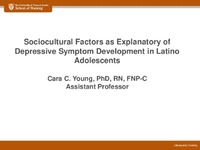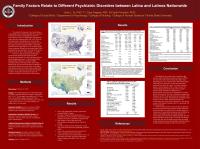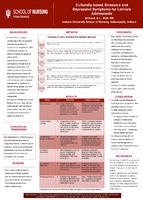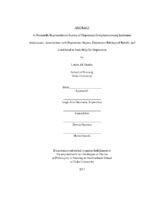| dc.description.abstract | <p><strong>Purpose:</strong> Latino adolescents consistently report the highest levels of depressive symptoms and disorders when compared to non-Hispanic White, African American and Asian American adolescents (Stein et al., 2010). Suicide, the most devastating outcome of depression, is the third leading cause of death for youth ages 10-24, and Latina adolescents attempt suicide significantly more that their non-Hispanic peers (Centers for Disease Control and Prevention, 2012). Despite these well documented disparities, relatively little research has evaluated why Hispanic adolescents appear to be at greatest risk for depressive symptoms. Currently in the United States, 1 in 5 youth under the age of 18 is Latino, and population projections indicate by 2050, 40% of the youth population will be Latino (Ortman & Guarneri, 2009). The elevated levels of depressive symptoms in this expanding population represent a growing need for depression prevention and treatment programs that are sensitive to Latino adolescents' specific cultural and psychosocial needs. The purpose of this study is to examine individual- and contextual- level sociocultural factors associated with the development of depressive symptoms in Latino adolescents in order to identify salient risk factors to target in the construction of culturally relevant prevention and treatment interventions.</p>
<p><strong>Methods:</strong> Latino adolescents (12-18 years) were recruited (N= 118) from a pediatric health care clinic in a rural community in central Texas for a cross-sectional, descriptive study. After informed consent and adolescent assent were obtained, participants completed a survey in Spanish or English containing a demographic questionnaire and standardized measures assessing theoretically guided variables from Zayas and colleagues' (2005) conceptual model of Latina adolescent suicide (i.e., acculturation, discrimination, ethnic identity, familism, family conflict and cohesion, and depressive symptoms). Pearson correlations were calculated to assess the bivariate associations between the variables. Hierarchical linear regression methods determined the unique contribution of each of the independent variables to depressive symptoms.</p>
<p><strong>Results:</strong> Latino ethnic heritage was reported by 83% (n=96) of participants. Almost half (46%) of the sample reported high levels of depressive symptoms. Elevated depressive symptoms were associated with higher levels of discrimination (r=.347, p<.001) and family conflict (r=.423, p<.001), and lower levels of familism (r=.306, p=.001), ethnic identity (r=-.244, p=.009), and family cohesion (r=-.306, p=.001). Hierarchical linear regression analysis indicated these sociocultural variables explained 40% of the variance in depressive symptoms (R2=.404, p<.001). After controlling for all study variables, discrimination (?? =.383, p<.001), familism (?? = .261, p=.005), and family conflict (?? = .389, p<.001) were unique contributors to depressive symptoms.</p>
<p><strong>Conclusion:</strong> The high levels of depressive symptoms reported by this Latino adolescent sample is concerning and confirms prior research documenting high depressive symptom prevalence in this population. The large percentage of variance explained by individual- and contextual- level sociocultural factors underscore the need for culturally tailored depression prevention programs that target Latino adolescents. These results may not be generalizable to Latino adolescents living in other countries, particularly those residing in their county of racial and ethnic origin. Future research with Latino adolescents outside of the United States is needed to disentangle the relationships among sociocultural factors (e.g., acculturation, ethnic identity, and discrimination) and depressive symptoms.</p> | en |





